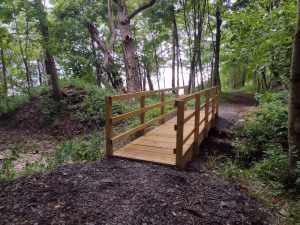SYRACUSE — New life could soon be returning to a massive vacant building on the Near West Side of Syracuse. A group of partners is planning a redevelopment of the 55,000-square-foot Engleburg Huller Building at 831 W. Fayette St. The structure was originally built in the late 1800s and spans an entire city block, according […]
Get Instant Access to This Article
Become a Central New York Business Journal subscriber and get immediate access to all of our subscriber-only content and much more.
- Critical Central New York business news and analysis updated daily.
- Immediate access to all subscriber-only content on our website.
- Get a year's worth of the Print Edition of The Central New York Business Journal.
- Special Feature Publications such as the Book of Lists and Revitalize Greater Binghamton, Mohawk Valley, and Syracuse Magazines
Click here to purchase a paywall bypass link for this article.
SYRACUSE — New life could soon be returning to a massive vacant building on the Near West Side of Syracuse.
A group of partners is planning a redevelopment of the 55,000-square-foot Engleburg Huller Building at 831 W. Fayette St. The structure was originally built in the late 1800s and spans an entire city block, according to Short Enterprises of Syracuse, which is handling project development for the effort.
Michael Short, Short Enterprises CEO, says the hope is to transform the building into manufacturing, art studio, and entrepreneurial flex space. The first phase of the project would renovate about 30,000 square feet on the building’s first floor. A second phase would involve demolishing a portion of the building to expand parking.
Plans for the structure’s upper floors are still in the works, Short says, but could involve living space for building tenants.
The flex space would be aimed at early-stage companies just leaving incubators like the Tech Garden in downtown Syracuse. Short, who formerly worked with Syracuse University’s Near Westside Initiative, says it always bothered him that young companies were often asked to sign long leases or pay high rents they couldn’t afford early on.
Short launched his company in the fall of 2011 after his time with the Near Westside Initiative, an effort spearheaded by Syracuse University to aid the neighborhood. Short Enterprises provides services including grant and proposal writing for businesses and nonprofits, aid with various development incentives, and consulting on economic-development projects.
The firm has signed up more than 15 clients so far and is working on nearly $12 million in redevelopment projects in Syracuse. Short is aiming to hire as many as five people over the next year.
The idea for the Engleburg Huller building is to keep leases flexible and allow young companies to gain a foothold in their markets, Short says. The space should aid the Near West Side, he adds.
Once companies establish themselves in the neighborhood, they’re more likely to stay, he notes. The facility would be designed for four to five tenants.
Short says he’s already been in talks with potential occupants, including a company that works with reclaimed iron to create high-end cookware. It’s the kind of company that could hire people from within the Near West Side neighborhood, he adds.
In 2000, Scott Rimualdo, who was running a countertop business at the time, bought the building and planned to turn it into a mixed-use facility.
Rimualdo died in a car crash in 2002, but his estate still owns the building in the partnership with James Raite, owner of Syracuse–based contractor Time Cap Development Corp. Rimualdo’s father Ralph is the CFO at Time Cap and manages his son’s estate.
Ralph Rimualdo says he’s hopeful the building can spark further growth in the Near West Side neighborhood.
“It just amazes you, the number of businesses in that area,” he says. “It’s a really great group of people. They’re really impressive.”
Ralph Rimualdo notes that plans for the building have not been finalized and until they are, no financing can be lined up. There’s also no firm timeline for when construction will start, he adds.
Short says he’s hopeful work can begin this year.
Now is certainly a good time to take on a project like this, Ralph Rimualdo says. While the struggling economy has hampered development on projects around the country, it has also driven material costs lower.
And the economy will recover, Ralph Rimualdo adds. Having a project that can ride that recovery would be a good thing.
“This is an opportune time to do it,” he says of the redevelopment project.



